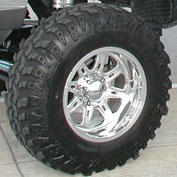 Anyone who has driven the 610 loop has probably noticed that Houston truck accessories come in a wide variety of options and styles. Many owners, particularly those who use their vehicles to haul heavy or bulky items, add truck bedliners to protect the finish of the pick bed. Truck lift kits add the finishing touch to create a unique, customized pickup. However, when it comes to accessories, the greatest variety is in the wheels chosen to make just the desired statement.
Anyone who has driven the 610 loop has probably noticed that Houston truck accessories come in a wide variety of options and styles. Many owners, particularly those who use their vehicles to haul heavy or bulky items, add truck bedliners to protect the finish of the pick bed. Truck lift kits add the finishing touch to create a unique, customized pickup. However, when it comes to accessories, the greatest variety is in the wheels chosen to make just the desired statement.
Truck wheels come in many different designs. Different manufacturers use different methods of construction or materials. With some wheels, the material used dictates the construction method, while the reverse can also be true. One of the first decisions that must be made when shopping for new truck wheels is to decide which material to choose.
Steel
Steel has long been the standard for the wheels on vehicles of all types. It is stronger and heavier than aluminum. Steel wheels are typically made by using a powerful press to stamp out the parts, which are then welded to make the wheel. This method does not permit much artistic expression, such as intricate spoke designs. Buyers are pretty much limited to plain wheels, perhaps with openings to enhance brake cooling. However, some manufacturers have made chrome-clad steel wheels standard options on their trucks. Chrome-clad wheels have a thin, chrome-plated overlay that is affixed to the wheel’s surface.
Aluminum Alloy
An alloy of nickel and aluminum is commonly used for truck wheels. However, the ratio of the metals determines the properties of the wheel. If the mixture contains a higher proportion of nickel, the wheel is heavier and less prone to bending, but they can be more likely to crack or be brittle. If the mixture has a lower proportion of nickel, the wheel is lighter, but it is also more prone to bending when impacting a curb, pothole or other obstruction.
Cast Aluminum Wheels
Manufacturers normally use one of two basic types of casting to create wheels.
- Pressure casting may be low-pressure or counter-pressure. The low-pressure method forces the molten alloy into a mold by applying air pressure, which packs the alloy more densely into the mold and makes it stronger. The counter-pressure method uses reverse air pressure by creating a vacuum to suck the alloy into the mold. It produces similar results to the low-pressure method.
- Gravity casting lets gravity do the work to fill the mold with the molten alloy. This method is the simplest, but it also produces wheels with the least density. To ensure that the wheels are strong enough, manufacturers make the wheels heavier and thicker than those produced by pressure casting.
Flow Formed Wheels
Flow-formed wheels are made using a hybrid manufacturing process. It starts with an alloy formed using the low-pressure casting method. The alloy is then stretched and shaped through the use of high-pressure rollers and heat. This produces an alloy that is both dense and thin, and these wheels share many properties with forged aluminum wheels.
Forged Wheels
Forged aluminum is made by subjecting a solid chunk of alloy and then using an extreme amount of pressure and heat to crush it into the proper shape. Forged aluminum wheels are extremely strong and dense, but they are also quite light. These wheels are much stronger than those made from cast aluminum.
Putting Everything Together
Once the wheel material has been selected, the next step is to choose the design. The right wheels can make a pickup stand out from the crowd. To add even more personality, a lift kit can create an impressive look, and Houston bedliners are not only decorative, but they are also protective. Other after-market accessories, such as side mirrors, toolboxes and lights, can help truck owners create a vehicle that is individually unique.
